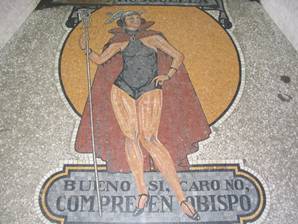 From very young age I liked to read novels of manners. The genre, of one form or another, most intellectual or popular, in the eighteenth century was seen in the work of the historian José Martín Félix de Arrate, in the nineteenth century of Luis Victorian Betancourt and in the twentieth century in the work of Jorge Mañach, Emilio Roig, José Lezama Lima, Méndez Capote, Carballido Rey, Castor Vispo, Robreño, Marcos Behmaras, Núñez Rodríguezand others. In addition, Eladio Secades, a journalist dedicated to the sports page, practiced it successfully with his Engravings of the Era, where he portrayed both the pretentious professor and the mulata sandunguera, the refined grocer, the predatory politician, the demagogue candidate, or the moneylender, and he painted a fresco of the society he lived, dotted with fine strokes of humor.
From very young age I liked to read novels of manners. The genre, of one form or another, most intellectual or popular, in the eighteenth century was seen in the work of the historian José Martín Félix de Arrate, in the nineteenth century of Luis Victorian Betancourt and in the twentieth century in the work of Jorge Mañach, Emilio Roig, José Lezama Lima, Méndez Capote, Carballido Rey, Castor Vispo, Robreño, Marcos Behmaras, Núñez Rodríguezand others. In addition, Eladio Secades, a journalist dedicated to the sports page, practiced it successfully with his Engravings of the Era, where he portrayed both the pretentious professor and the mulata sandunguera, the refined grocer, the predatory politician, the demagogue candidate, or the moneylender, and he painted a fresco of the society he lived, dotted with fine strokes of humor.
Currently there are some journalists who practice the art, and some writers, but, at least in what they publish, they only tell stories about the events and characters of the colonial and republican times. It seems that there is an impenetrable wall starting from 1959. I do not know if by any statutory provision or simply because of the widespread self-censorship.
I think in the so-called revolutionary era, where there is enough fabric cut from absurd events and extravagant characters, original material would lend itself to magnificent chronicles.
Let’s remember a few: the one who tried to reorganize the domestic trade, now socialist, applying his golden rule; those who bought and brought cotton pickers, before having planted a single plant which, of course, never grew more than a few centimeters, gave not a speck of cotton, and dried up; those who imported snowplows for the city of Havana; those who, when there was no food or clothing or shoe stores loaded up on vases, trunks, chests and traditional Chinese wooden, porcelain and jade figures at unaffordable prices.
And then there were: Fruticubas all over the city when the fruit disappeared; those who, in the absence of products to sell, converted the windows of the shops into niches, painted inside with little circles, squares or rectangles where we might see a lone vase, a painting or a clay figure placed inside. The idea was that because we have socialism it is unnecessary to have commercial advertising or display goods.
This is a simple sample. There is probably a larger number of events and characters worthy of a chronicle, of the colonial and republican eras combined.
If choosing among the current and the earlier chroniclers, I prefer the earlier. At least they exercised their profession with irony, subtle humor, courage, intelligence and a high dose of civility, noting both the positive and negative around them, bringing their grain of sand to the development of the nation. There is no doubt that writing about the distant past is less complicated than doing it about what is close at hand. And also less dangerous!
November 28 2011
